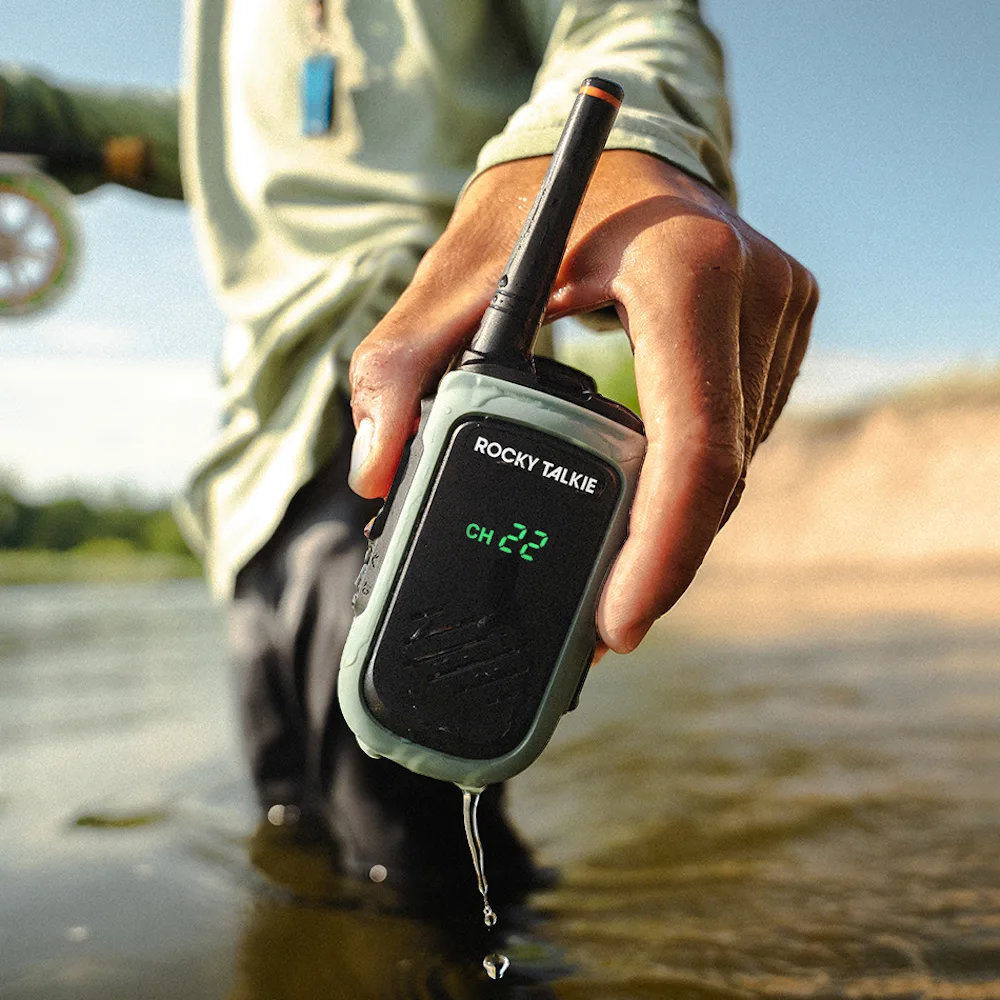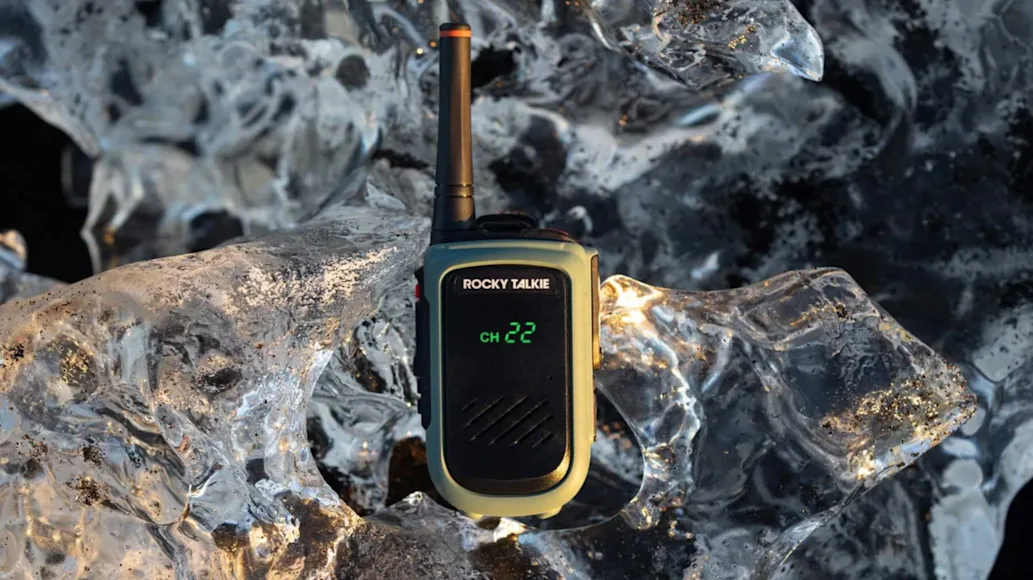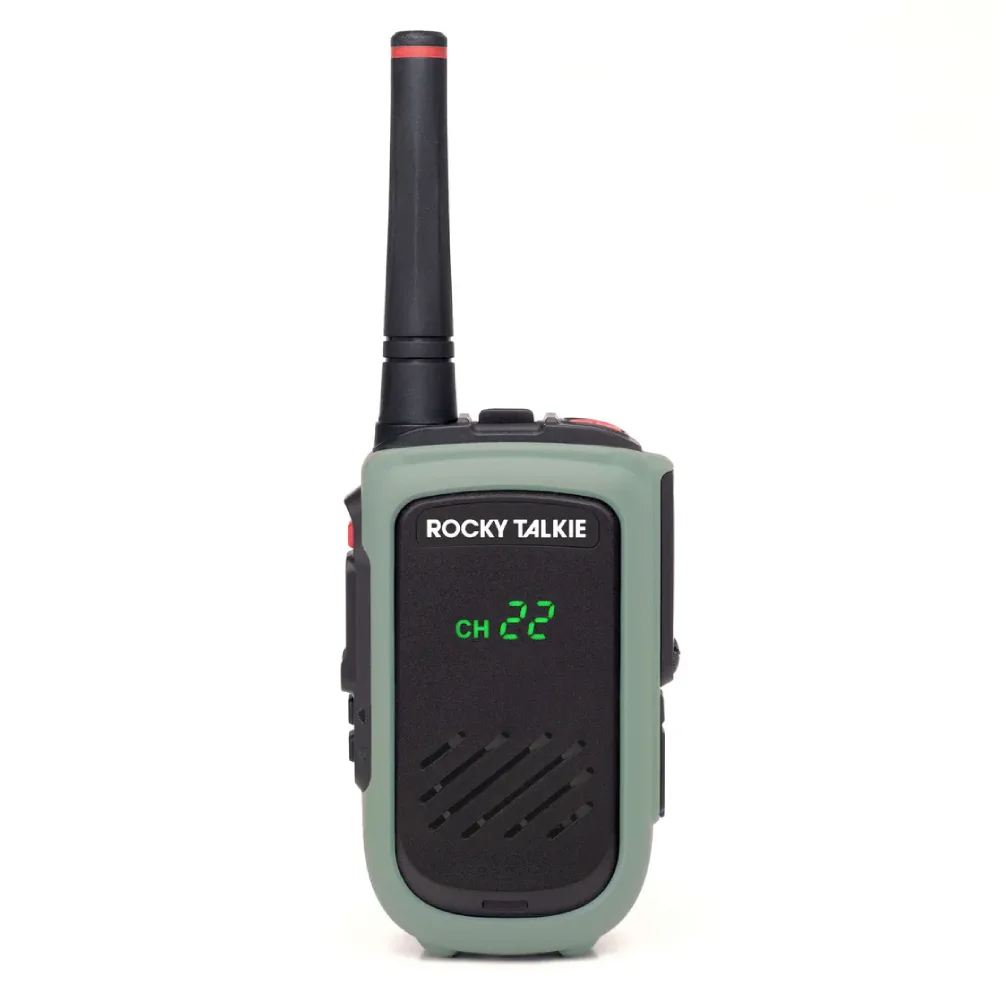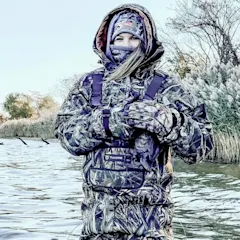We take our gear seriously at F&S, whether it be for hunting, fishing, or camping. Our selections are based on many factors, like quality, price, and purpose—just to name a few. But sometimes there’s more to a fishing jacket or hunting knife than what you see.
Through my years of covering the best outdoor gear, I’ve discovered some really cool brands with some really cool stories doing some really cool things. In our new “Behind the Brand” interview series, we are telling those stories through the words of the founders themselves.
As someone who basically grew up in the backcountry of the West, Bryce Jones knows that the right gear can make a big difference—sometimes even a life-saving one. So when he and Alex Page witnessed a communication breakdown while scaling Utah's Castleton Tower, the two friends decided to develop a much-needed device: the most rugged walkie talkie around. And thus began Rocky Talkie.
We sat down with Bryce to learn about how Rocky Talkie got started, and what makes the brand's famous Mountain Radio so unique. Plus, we got an inside look on the new, fully waterproof 5 Watt Radio.
Field & Stream: Take us back to the beginning. How did you get into the outdoor industry?
Bryce Jones: I was raised in a pretty adventurous family, where my vacations growing up were mostly backcountry camping trips. Looking back, I think those vacations were pretty foundational for me. They led to my sense of adventure and my passion for the outdoors.
Fast forward a bit, I finished grad school in 2015 and moved to Colorado to start a career and basically spend all of my time in the mountains snowboarding and rock climbing. So when I decided to start a company, all my business ideas naturally gravitated towards the outdoor industry.
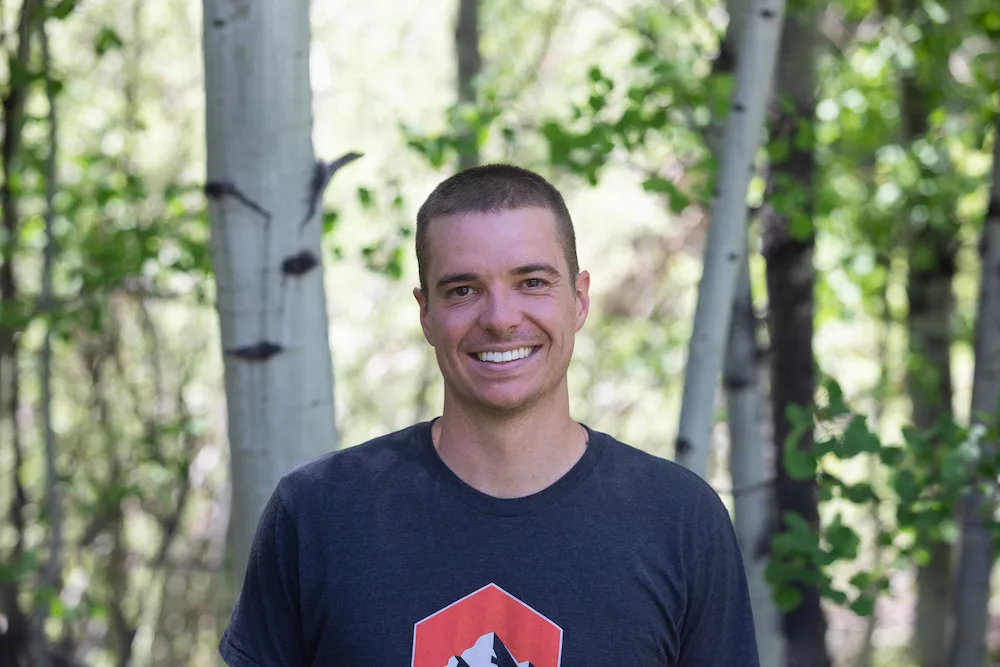
How did you start Rocky Talkie?
I launched Rocky Talkie with my co-founder, Alex Page. Alex and I actually grew up down the street from each other, and we spent two years together at grad school at the University of Michigan. From all this time spent together, we knew we made a really good team—we balanced each other out really well from a skillset perspective—and we knew we wanted to start a business together at some point.
The spark behind Rocky Talkie came in 2017. Alex and I were climbing Castleton Tower in Utah. It's this iconic 400-foot sandstone rock tower near Moab. That day, there was a guy above us who was attempting to repel the route we were climbing on, but his rope wasn't long enough. He was dangling at the bottom of his rope trying to yell up to his partner to let him know he was stuck, but his partner was too far away and couldn't hear him.
Alex and I witnessed this communication breakdown on the wall and it kicked off a long conversation for us that day. We were like, why aren't walkie talkies more common for climbing? It seemed like total common sense and we'd actually brought some radios we'd just bought off Amazon with us that day. But then an hour later when we were reaching the top of our climb, our radios were already out of battery. So a lot that day set things in motion.
After some more research, we confirmed that, surprisingly, there really weren't any radios that were reliable and easy to use for our adventures. So ultimately, we launched Rockie Talkie to try to solve that problem.
Alex and I had never worked in e-commerce or electronics manufacturing before. We figured we'd start small while we were learning the space, and then hopefully scale up from there. We didn't raise any outside capital. We just both put all of our life savings into the business. We launched Rocky Talkie in late 2019. It was just 2,000 radios stacked floor to ceiling in my apartment in Denver. It was pretty exciting.

How did you come up with the name Rocky Talkie?
I wish there was a better story, but it was literally the first name I threw out to Alex that day at Castleton. Deciding on the spelling of the name took longer than deciding on the name itself, which is really funny.
How did you develop the Mountain Radio?
Alex and I don't have a traditional radio background. So since day one, our process has been to prototype, test, and then iterate. For example, we knew we wanted our push-to-talk button on the radio to be large and easy to press while wearing winter gloves. But we also wanted it well protected, so it couldn't be damaged in the outdoors or pressed accidentally. So for that single design challenge, we iterated through four different prototypes of the button design before we were happy that we struck the right balance.
Ultimately, we're convinced if you maintain that same level of attention and detail throughout the design, you end up with a great product: the Mountain Radio.
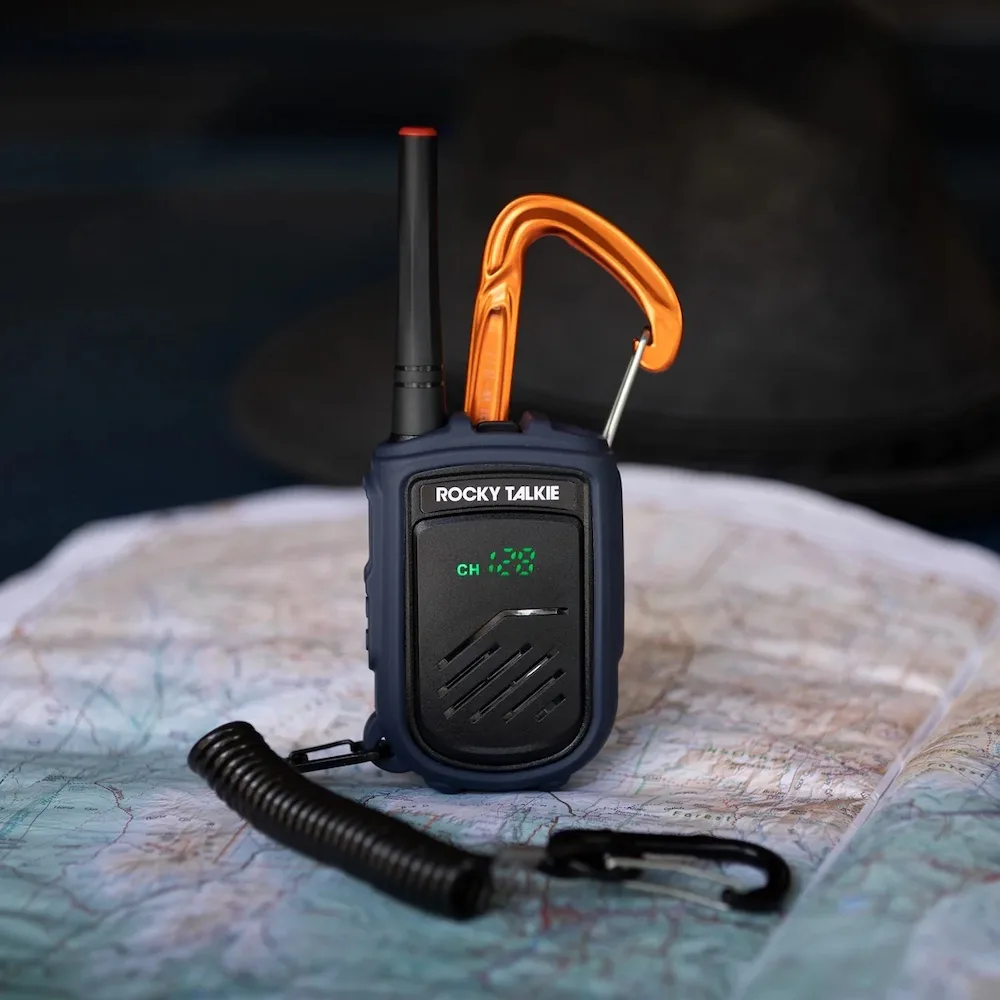
What makes the Mountain Radio different than any other radio?
We have four design priorities that we think about when we're designing any radio that we make: range, battery life, durability, and ease of use.
Range: Range is regulated, but the FCC limits you to a maximum power you're allowed to use for a radio, depending on the device type. Our goal is always to achieve the best possible range for a given radio, which generally means using the maximum power we're legally allowed to use. That's a huge priority for us and our customers.
Battery life: We have incredibly high standards for battery life and all of our radios get over four days of battery life even in extremely cold conditions. We achieve this by only using super efficient electronics and sourcing really high quality batteries.
Durability: We build all of our radios to withstand super harsh environments and we truly put them to the test in those environments.
Ease of use: I would say most other brands actually include more features in their radio. But our focus is on selecting the features that are most useful to backcountry sports and then making them as easy to use as possible.
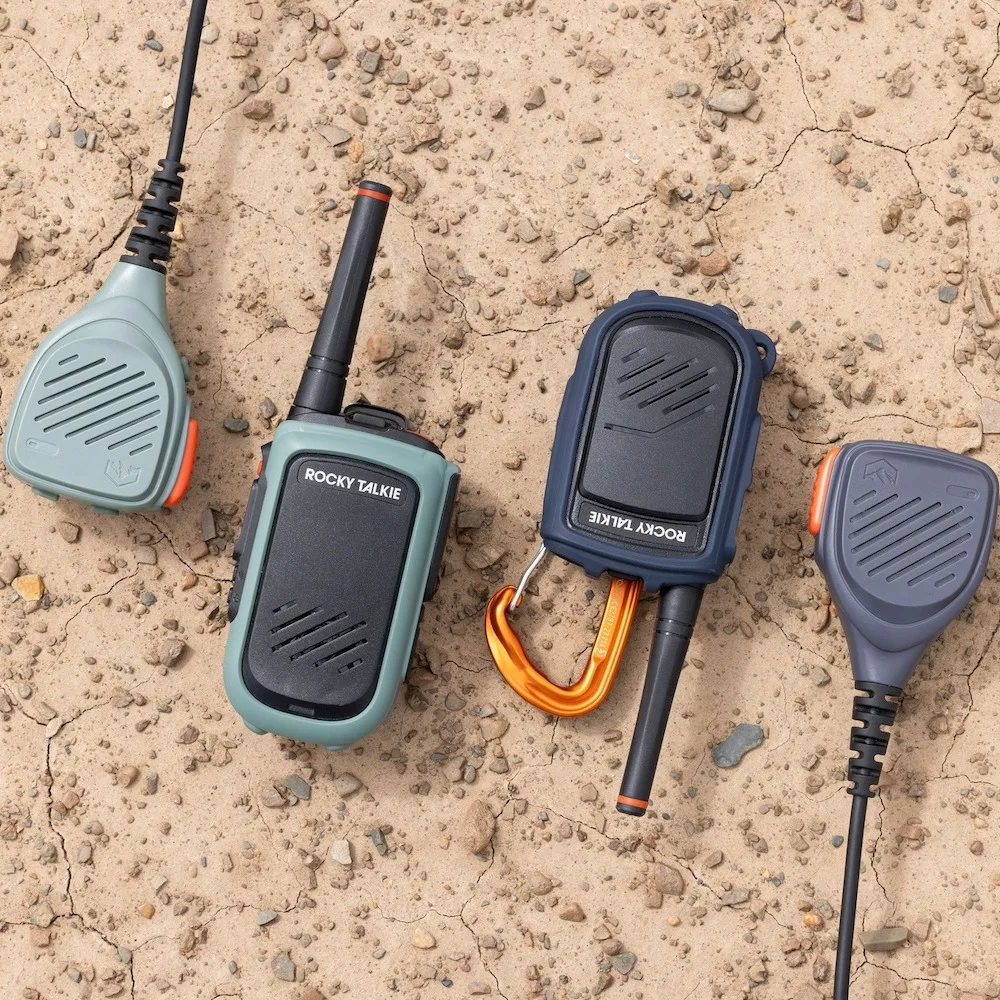
What inspired you to then create the 5 Watt Radio?
We developed our initial mountain radio for our main sports—like climbing and skiing—which we really knew and were involved with. But it has quickly become super popular for really any adventure where you need a rugged device, whether that's hiking, mountain biking, or hunting.
However, we would frequently get messages those first couple of years for people who loved the radio, but wanted a fully waterproof radio for water sports and a GMRS radio for higher power output. So that was the impetus behind us developing and launching our 5 Watt Radio.
It has an IP67 waterproof rating, so you can fully submerge it. And it has 5 watts of power, instead of the 2 watts of the Mountain Radio. We're super proud to have a great option for nearly any adventure and anyone looking for better communication on the water or in the backcountry.
What's next for Rocky Talkie?
Our focus is on ramping up production on our new 5 Watt radio. It's been really popular since we launched—so much so that it sold out at one point. We're also developing a bunch of new accessories this year to support both our mountain radios and 5W radios, like a headset and mounts.
What is the $2 pledge?
When we launched Rocky Talkie, we made a pledge to donate $2 per radio to volunteer search and rescue teams around the country. We wanted to give back to a cause where we felt like we could make a true impact and that felt super aligned with our mission at Rocky Talkie. We admire that group of individuals so much.
I don't think most people realize that rescue teams are nearly entirely volunteer based and most are quite underfunded and reliant on donations. Yet there's more and more people going into the backcountry each year. That means there's more and more lives that volunteer search and rescue teams are saving. We've given over $200,000 now to those groups, and hopefully that support continues to increase in the future.
What's your favorite outdoor activity?
Rock climbing, for sure. Lately my wife and I have been spending most of our time climbing and trail running with Pax, our golden retriever.
Do you have a favorite place to climb?
I would say the Moab area—where Castleton Tower is—has always been rugged and the most inspired for me. Those freestanding rock towers are just so incredible and always offer a really awesome adventure.
What do you love most about the outdoors?
Like many people, I spend a lot of time in my own head. Outdoor sports are the best way I found to bring me back and make me more present.
